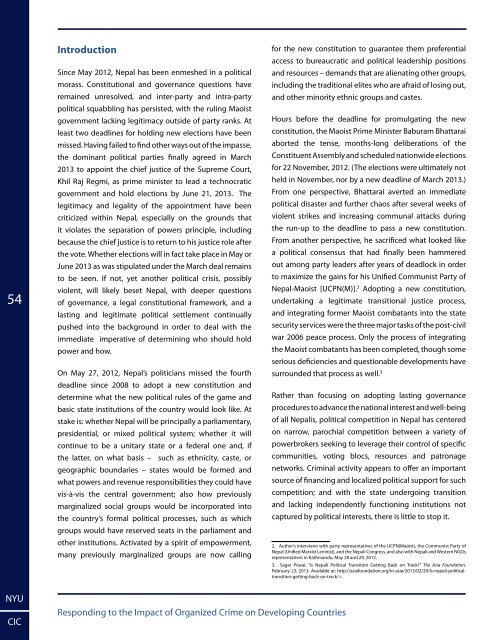here - Center on International Cooperation - New York University
here - Center on International Cooperation - New York University
here - Center on International Cooperation - New York University
Create successful ePaper yourself
Turn your PDF publications into a flip-book with our unique Google optimized e-Paper software.
54<br />
Introducti<strong>on</strong><br />
Since May 2012, Nepal has been enmeshed in a political<br />
morass. C<strong>on</strong>stituti<strong>on</strong>al and governance questi<strong>on</strong>s have<br />
remained unresolved, and inter-party and intra-party<br />
political squabbling has persisted, with the ruling Maoist<br />
government lacking legitimacy outside of party ranks. At<br />
least two deadlines for holding new electi<strong>on</strong>s have been<br />
missed. Having failed to find other ways out of the impasse,<br />
the dominant political parties finally agreed in March<br />
2013 to appoint the chief justice of the Supreme Court,<br />
Khil Raj Regmi, as prime minister to lead a technocratic<br />
government and hold electi<strong>on</strong>s by June 21, 2013. The<br />
legitimacy and legality of the appointment have been<br />
criticized within Nepal, especially <strong>on</strong> the grounds that<br />
it violates the separati<strong>on</strong> of powers principle, including<br />
because the chief justice is to return to his justice role after<br />
the vote. Whether electi<strong>on</strong>s will in fact take place in May or<br />
June 2013 as was stipulated under the March deal remains<br />
to be seen. If not, yet another political crisis, possibly<br />
violent, will likely beset Nepal, with deeper questi<strong>on</strong>s<br />
of governance, a legal c<strong>on</strong>stituti<strong>on</strong>al framework, and a<br />
lasting and legitimate political settlement c<strong>on</strong>tinually<br />
pushed into the background in order to deal with the<br />
immediate imperative of determining who should hold<br />
power and how.<br />
On May 27, 2012, Nepal’s politicians missed the fourth<br />
deadline since 2008 to adopt a new c<strong>on</strong>stituti<strong>on</strong> and<br />
determine what the new political rules of the game and<br />
basic state instituti<strong>on</strong>s of the country would look like. At<br />
stake is: whether Nepal will be principally a parliamentary,<br />
presidential, or mixed political system; whether it will<br />
c<strong>on</strong>tinue to be a unitary state or a federal <strong>on</strong>e and, if<br />
the latter, <strong>on</strong> what basis – such as ethnicity, caste, or<br />
geographic boundaries – states would be formed and<br />
what powers and revenue resp<strong>on</strong>sibilities they could have<br />
vis-à-vis the central government; also how previously<br />
marginalized social groups would be incorporated into<br />
the country’s formal political processes, such as which<br />
groups would have reserved seats in the parliament and<br />
other instituti<strong>on</strong>s. Activated by a spirit of empowerment,<br />
many previously marginalized groups are now calling<br />
for the new c<strong>on</strong>stituti<strong>on</strong> to guarantee them preferential<br />
access to bureaucratic and political leadership positi<strong>on</strong>s<br />
and resources – demands that are alienating other groups,<br />
including the traditi<strong>on</strong>al elites who are afraid of losing out,<br />
and other minority ethnic groups and castes.<br />
Hours before the deadline for promulgating the new<br />
c<strong>on</strong>stituti<strong>on</strong>, the Maoist Prime Minister Baburam Bhattarai<br />
aborted the tense, m<strong>on</strong>ths-l<strong>on</strong>g deliberati<strong>on</strong>s of the<br />
C<strong>on</strong>stituent Assembly and scheduled nati<strong>on</strong>wide electi<strong>on</strong>s<br />
for 22 November, 2012. (The electi<strong>on</strong>s were ultimately not<br />
held in November, nor by a new deadline of March 2013.)<br />
From <strong>on</strong>e perspective, Bhattarai averted an immediate<br />
political disaster and further chaos after several weeks of<br />
violent strikes and increasing communal attacks during<br />
the run-up to the deadline to pass a new c<strong>on</strong>stituti<strong>on</strong>.<br />
From another perspective, he sacrificed what looked like<br />
a political c<strong>on</strong>sensus that had finally been hammered<br />
out am<strong>on</strong>g party leaders after years of deadlock in order<br />
to maximize the gains for his Unified Communist Party of<br />
Nepal-Maoist [UCPN(M)]. 2 Adopting a new c<strong>on</strong>stituti<strong>on</strong>,<br />
undertaking a legitimate transiti<strong>on</strong>al justice process,<br />
and integrating former Maoist combatants into the state<br />
security services were the three major tasks of the post-civil<br />
war 2006 peace process. Only the process of integrating<br />
the Maoist combatants has been completed, though some<br />
serious deficiencies and questi<strong>on</strong>able developments have<br />
surrounded that process as well. 3<br />
Rather than focusing <strong>on</strong> adopting lasting governance<br />
procedures to advance the nati<strong>on</strong>al interest and well-being<br />
of all Nepalis, political competiti<strong>on</strong> in Nepal has centered<br />
<strong>on</strong> narrow, parochial competiti<strong>on</strong> between a variety of<br />
powerbrokers seeking to leverage their c<strong>on</strong>trol of specific<br />
communities, voting blocs, resources and patr<strong>on</strong>age<br />
networks. Criminal activity appears to offer an important<br />
source of financing and localized political support for such<br />
competiti<strong>on</strong>; and with the state undergoing transiti<strong>on</strong><br />
and lacking independently functi<strong>on</strong>ing instituti<strong>on</strong>s not<br />
captured by political interests, t<str<strong>on</strong>g>here</str<strong>on</strong>g> is little to stop it.<br />
2. Author’s interviews with party representatives of the UCPN(Maoist), the Communist Party of<br />
Nepal (Unified Marxist Leninist), and the Nepali C<strong>on</strong>gress, and also with Nepali and Western NGOs<br />
representatives in Kathmandu, May 28 and 29, 2012.<br />
3. Sagar Prasai. “Is Nepali Political Transiti<strong>on</strong> Getting Back <strong>on</strong> Track?” The Asia Foundati<strong>on</strong>.<br />
February 23, 2013. Available at: http://asiafoundati<strong>on</strong>.org/in-asia/2013/02/20/is-nepali-politicaltransiti<strong>on</strong>-getting-back-<strong>on</strong>-track/>.<br />
NYU<br />
CIC<br />
Resp<strong>on</strong>ding to the Impact of Organized Crime <strong>on</strong> Developing Countries
















